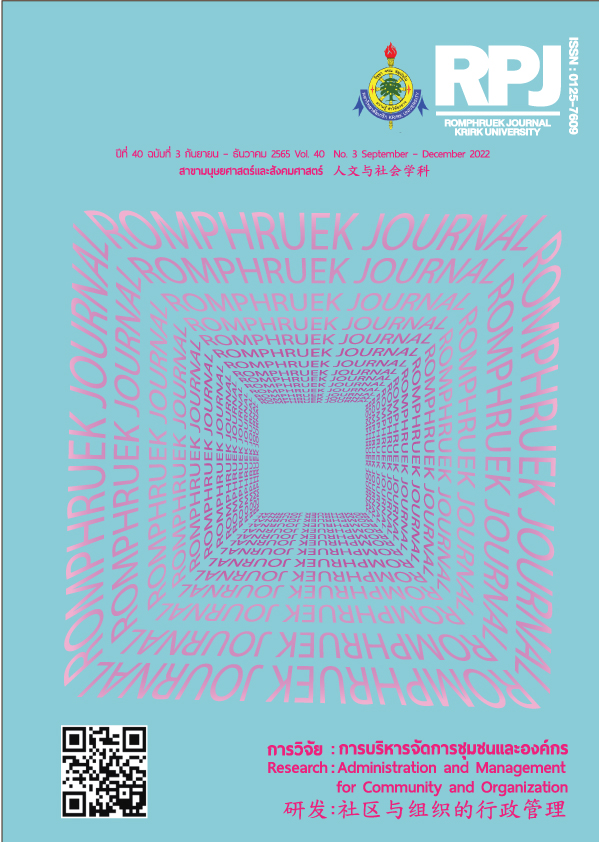The Problem in Protection of the Rights And Liberties of the Alleged Offenders or the Defendants in Drug Cases under the Constitution of The Kingdom of Thailand B.E.2560
Main Article Content
Abstract
This research aims to find answers for more effective development of protection of rights and liberties of the alleged offenders or the defendants in drug cases under the Constitution of the Kingdom of Thailand, B.E. 2560. The qualitative research science consists of document research, in-depth interviews, and group chat. The answers obtained are used to develop and amend the law under the Act Promulgating the Drug Code, B.E. 2564.
The findings of the research were the answer to the protection of rights and (freedoms) liberties of the alleged offenders or the defendants in drug cases; the meaning of the word "sell"; the provisions relating to the quantity of narcotics of category I and criminal penalties in some cases of narcotics that are unsuitable for use at present These findings led to the creation of a model law for the development of the Act Promulgating the Narcotics Code B.E. 2564.
By analyzing the Narcotics Act B.E. 2522 which has been repealed. on the determination of the amount of narcotics of category 1 under section 15, paragraph three, and criminal penalties section 65 to section 67, the researcher recommended an act to apply the Narcotics Code B.E. 2564. in some cases to be much more fair and better protect the rights and liberties of the alleged offenders or the defendants in drug cases.
Article Details

This work is licensed under a Creative Commons Attribution-NonCommercial-NoDerivatives 4.0 International License.
Every article published in the Romphruek Journal of the Humanities and Social Sciences is the opinion and point of view of the authors. Thery're not the viewpoint of Krirk University or the editored department. Any part or all of the articles for pablication must be clearly cited.
References
กอบกูล จันทวโร และคณะ. (2558). มาตรการทางกฎหมายในการพัฒนาทางเลือกสำหรับผู้กระทำผิดคดี ยาเสพติดเพื่อสนับสนุนการดำเนินงานตามข้อกำหนดกรุงเทพฯ. กรุงเทพฯ : สำนักกิจการในพระดำริ พระเจ้าหลานเธอพระองค์เจ้าพัชรกิตติยาภา สำนักงานปลัดกระทรวงยุติธรรม.
เกียรติขจร วัจนะสวัสดิ์. (2549). คำอธิบายกฎหมายอาญา ภาค 1. กรุงเทพฯ : จิรรัชการพิมพ์.
คณะกรรมาธิการสากลว่าด้วยนโยบายยาเสพติด. (2557). เข้าควบคุม : เส้นทางสู่นโยบายยาเสพติดที่มีประสิทธิผล = Taking control : pathways to drug policies that work. กรุงเทพฯ : สำนักกิจการในพระดำริพระเจ้าหลานเธอพระองค์เจ้าพัชรกิติยาภา.
ปะวินี ไพรทอง. (2551). ปัญหาการนำบทสันนิษฐานเด็ดขาดมาใช้ในพระราชบัญญัติยาเสพติดให้โทษ พ.ศ. 2522. คณะนิติศาสตร์ จุฬาลงกรณ์มหาวิทยาลัย, กรุงเทพฯ.
สิงห์พิทักษ์ ละมูลมอญ. (2556). ปัญหาการใช้ดุลยพินิจของศาลในการบังคับใช้พระราชบัญญัติฟื้นฟูสมรรถภาพ ผู้ติดยาเสพติด พ.ศ. 2545. (30 สิงหาคม 2564) สืบค้นจาก https://library.coj.go.th/pdf-view.html?fid=1524&table=files_biblio.
สุรศักดิ์ ลิขสิทธิ์วัฒนกุล และ ปกป้อง ศรีสนิท. (2558). การศึกษาเพื่อพัฒนาแนวทางการลงโทษ : หลักการลงโทษที่ได้สัดส่วน กรณีคดียาเสพติดให้โทษ. กรุงเทพฯ : สำนักกิจการในพระดำริพระเจ้าหลานเธอพระองค์เจ้าพัชรกิติยาภา สำนักงานปลัดกระทรวงยุติธรรม.
สำนักงานคณะกรรมการป้องกันและปราบปรามยาเสพติด กระทรวงยุติธรรม. (2546). แนวทางการดำเนินงาน Roadmap การต่อสู้เพื่อเอาชนะยาเสพติด ระยะที่ 3 (3 ธันวาคม 2546 – 30 กันยายน 2547). (30 สิงหาคม 2564) สืบค้นจาก https://www.ogad.ago.go.th/dagsu/images/stories/v47/v43.pdf.
อภิรัตน์ เพ็ชรศิริ. (2562). ทฤษฎีอาญา. กรุงเทพฯ : สำนักพิมพ์วิญญูชน.


